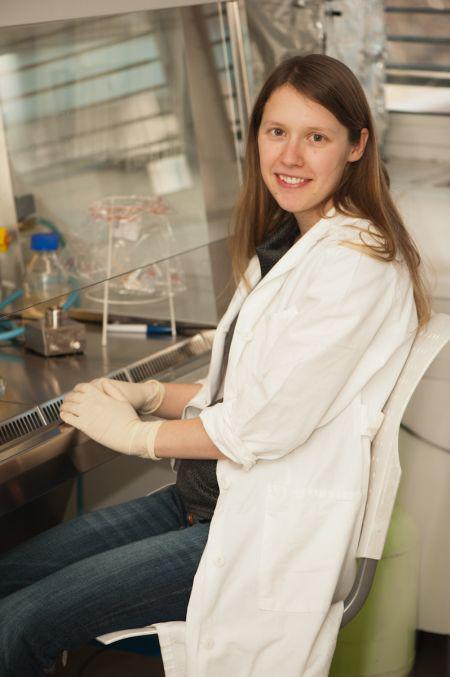
Barbara Hubad is one of the three recipients of this year’s “For Women in Science” national scholarship. The young scientist is about to defend her PhD thesis in the field of biomedicine, and received the award for “exceptional work in science, done under the mentorship of scientific councillor Aleš Lapanje, PhD, a world renowned scientist in the field of molecular microbiology”. "She studies aerosolization and how bacteria survive in the air by using breeding and molecular biological methods", explains the laboratory’s webpage.
You’re one of the three young scientists who won this year’s award/scholarship “For Women in Science”. The scholarship is awarded solely to female scientists, which speaks on its own about the problem of too few women in science and, therefore, a need to promote science. Why do you think there are (too) few female scientists?
There are probably several reasons for this. According to statistics by the European Commission about half of the scientists with a PhD are women, but the difference manifests itself later in top positions, where the share of female scientists is only around 20 per cent. The top positions demand a lot of involvement and extra time, not only within the regular work hours, which is probably why many women decide to give priority to other things, such as taking care of their families (particularly when they have small or school-age children). This results in the absence of women from top positions, and when the children grow up, future inability to reach leading functions, since free posts are limited and the fluctuation of people in top places is very low.
You study aerosolization and how bacteria survive in the air. How would you describe the field of your work to an average person?
In my PhD thesis I studied the ability of bacteria to find their way into the air and how bacteria can survive in such environment once they’re in the air.
This is important for two reasons. One, which people are more familiar with, is the transfer of pathogen bacteria, those that may cause diseases (such as tuberculosis) through the air. To understand how to defend ourselves from air-borne diseases, we first need to (i) be able to detect these bacteria in the air and (ii) understand how their find their way into the air and how long they’re able to survive in the air. Based on these findings we can estimate the risk for people and how we can decrease or prevent the passage of bacteria into the air and reduce their number once they’re in the air. Without a good understanding we can only take preventative measure offhandedly, which unfortunately results in medical personnel falling ill.
As part of our research an air-sampling method has been developed. It allows us to detect only a few specific pathologic bacteria in the air and estimate hospital areas where medical workers have the highest risk of being exposed to these bacteria. Based on our research, the hospital has changed the air conditioning system and improved the protection of medical workers, which we’re especially proud of.
The other reason is ecological. The air is a medium that bacteria use due to their small size (a few micrometres) for transfer on shorter (a few metres) or longer distances (even thousands of kilometres, between two oceans). Therefore, the air is very important for the spread of bacteria on Earth and thus for the functioning of the ecosystem. As part of our research we have shown that not all bacteria are able to pass into the air, which is very important, since it may mean that some bacteria are more widely spread around the world than others.
Do you already know what you’ll be doing next? Do you see your future abroad?
I still have my PhD thesis to defend, but I’m already employed. I’m going to continue my career at AmpliPhi, LLC, a branch of the AmpliPhi Biosciences Coorporation from the USA, which is about to open new premises in Slovenia for the production and research of bacteriophages (viruses that destroy bacteria) for clinical tests. Although this is not exactly the same kind of research work that I had done so far, the knowledge and the scientific way of thinking acquired through my PhD studies proved to be very useful. I’m very fortunate to be able to be a part of creating the production of a medicine from the very start, which is a huge challenge, since the production processes in production control need to follow prescribed standards. This means that in the very beginning things need to be thought through thoroughly and good foundations set.
We can be proud that the good work of Slovenian scientists had been recognised by investors from abroad and attracted them to Slovenia. The investors financed the first such production in the world; it follows the most modern standards and trends for the production of pharmaceutical products. I find working with Americans very interesting. They’re all very enthusiastic; they welcome others who share this enthusiasm into their circle, too, which is why what’s important are not only the level of your education and work experience, but also the attitude to work and the willingness to learn.

































































